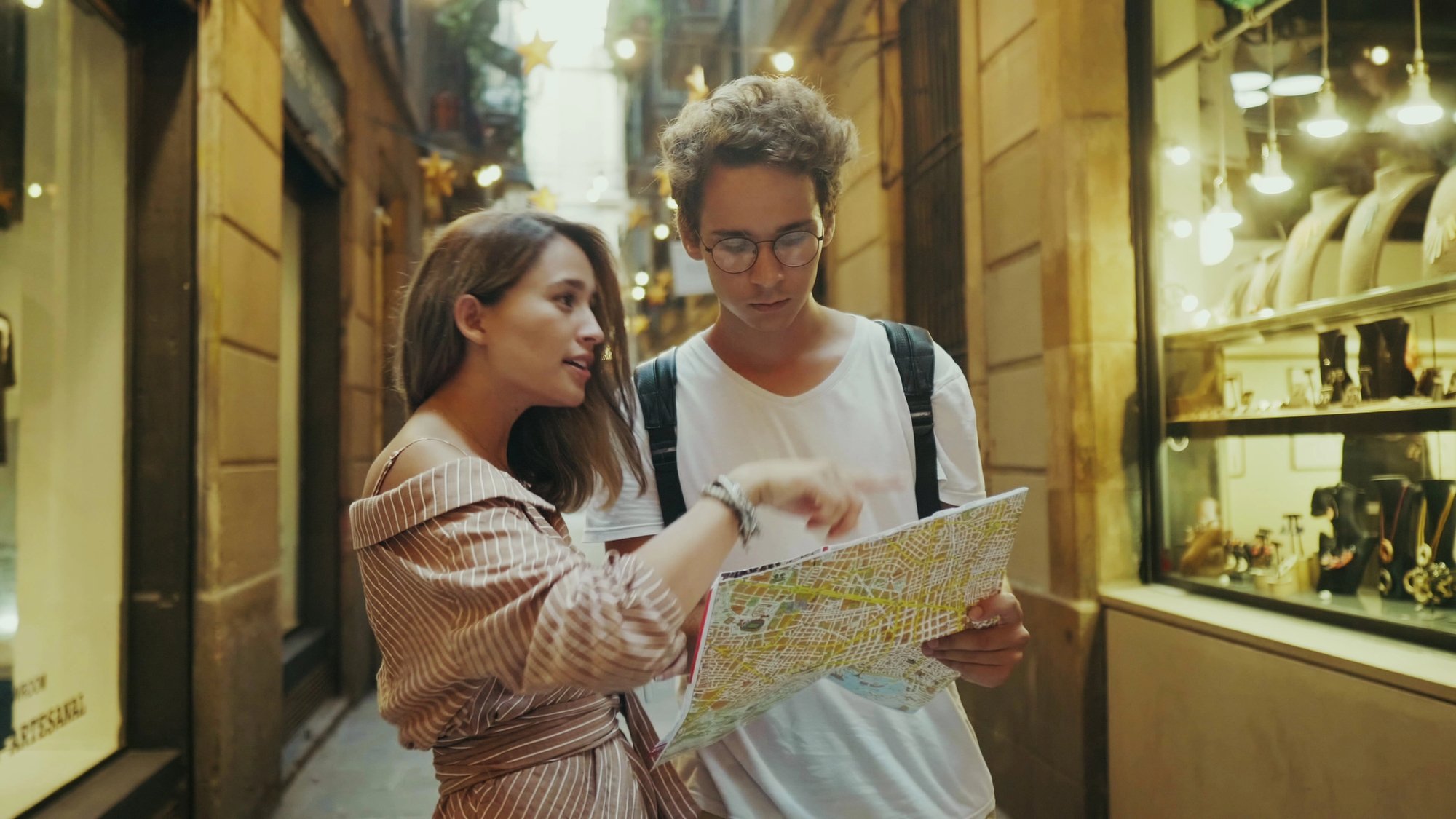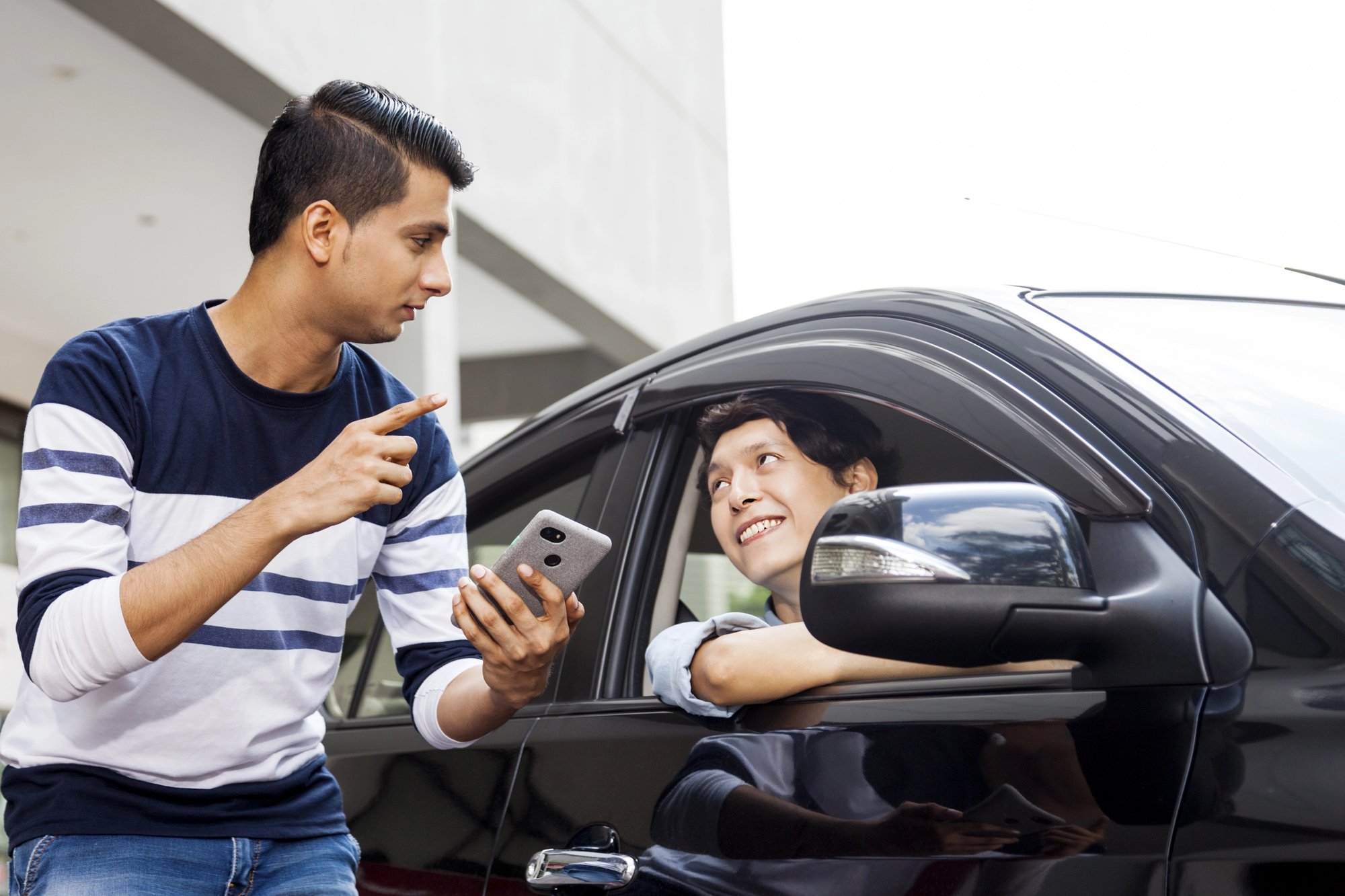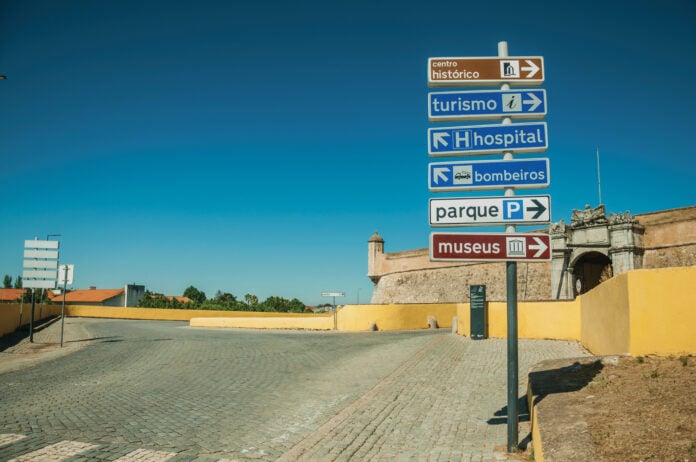The more Portuguese we learn, the more we realize how practical and polite the language can be. Building on our exploration of culture through idioms, let’s turn to something every traveler or new resident eventually needs: asking for and giving directions in European Portuguese.
Navigating Lisbon’s winding alleyways, Porto’s hilly streets, or a quiet village lane will all become easier with these phrases. They will not only help you get where you’re going but also connect you with locals in a friendly way. Portuguese people are generally happy to help, and even a few well-placed phrases will earn you a smile.
Below you’ll find 25 must-know expressions, with short introductions and real-world examples in European Portuguese to help you confidently find your way and maybe even guide someone else along theirs.
1. Onde fica…?
When you need to know the exact location of something, this is the go-to question. It’s short, clear, and polite.
Examples
• Onde fica a estação de comboios? (Where is the train station?)
• Onde fica o supermercado mais próximo? (Where is the nearest supermarket?)
2. Como chego a…?
This phrase is often used when you want step-by-step directions. It’s a very natural way to ask in Portugal.
Examples
• Como chego à Praça do Comércio? (How do I get to Praça do Comércio?)
• Desculpe, como chego ao hospital? (Excuse me, how do I get to the hospital?)
3. É longe? / Fica perto?
These questions help you understand the distance before deciding whether to walk or take transport.
Examples
• É longe daqui? (Is it far from here?)
• Fica perto do centro? (Is it near the centre?)
4. Vire à direita / Vire à esquerda
Locals often use these expressions when giving directions at junctions or crossroads.
Examples
• Vire à direita depois do banco. (Turn right after the bank.)
• Vire à esquerda na segunda rua. (Turn left at the second street.)
5. Siga em frente
This is one of the most common instructions. It simply means to keep going straight.
Examples
• Siga em frente até ao fim da rua. (Go straight ahead until the end of the street.)
• Depois do semáforo, siga em frente. (After the traffic light, go straight ahead.)
6. Está do lado direito / Está do lado esquerdo
These phrases point out on which side of the road your destination is.
Examples
• O café está do lado direito. (The café is on the right-hand side.)
• A farmácia fica do lado esquerdo. (The pharmacy is on the left-hand side.)
7. Perto daqui / Longe daqui
Quick expressions that locals often use to indicate distance in a simple way.
Examples
• Sim, é perto daqui. (Yes, it’s close by.)
• Não, é longe daqui. (No, it’s far from here.)
8. Pode mostrar-me no mapa?
If spoken directions are difficult to follow, this phrase allows you to ask for a visual explanation.
Examples
• Desculpe, pode mostrar-me no mapa? (Excuse me, can you show me on the map?)
• Não percebi bem, pode mostrar-me no mapa? (I didn’t quite understand, can you show me on the map?)

9. Fica ao pé de…
In Portugal, people often describe locations relative to landmarks. This is the phrase they’ll use.
Examples
• O museu fica ao pé da catedral. (The museum is next to the cathedral.)
• O hotel fica ao pé do rio. (The hotel is near the river.)
10. Atrás / À frente
These words help explain where something is in relation to another landmark.
Examples
• O restaurante fica atrás da igreja. (The restaurant is behind the church.)
• O mercado fica à frente da estação. (The market is in front of the station.)
11. Pode ajudar-me? Estou perdido/a.
If you’re really lost, this phrase is both polite and effective.
Examples
• Desculpe, pode ajudar-me? Estou perdido. (Excuse me, can you help me? I’m lost – said by a man.)
• Desculpe, pode ajudar-me? Estou perdida. (Excuse me, can you help me? I’m lost – said by a woman.)
12. Obrigado/a pela ajuda!
A polite thank-you always leaves a good impression.
Examples
• Obrigado pela ajuda! (Thank you for your help! – said by a man.)
• Obrigada pela ajuda! (Thank you for your help! – said by a woman.)

13. Pode repetir, por favor?
If you didn’t catch everything, this phrase is the polite way to ask again.
Examples
• Não percebi. Pode repetir, por favor? (I didn’t understand. Can you repeat, please?)
14. Fale mais devagar, por favor
In European Portuguese, “fale” is the polite form. It’s very useful when you feel that the Portuguese is being spoken too quickly for you to understand.
Examples
• Desculpe, pode falar mais devagar, por favor? (Sorry, can you speak more slowly, please?)
15. Está longe a pé?
This question checks if it’s realistic to walk or better to use transport.
Examples
• Está longe a pé ou devo apanhar o autocarro? (Is it far on foot or should I take the bus?)
16. É a primeira/segunda rua
Portuguese directions often refer to the “first” or “second” street. This keeps things clear.
Examples
• É a primeira rua à esquerda. (It’s the first street on the left.)
• É a segunda rua à direita. (It’s the second street on the right.)
17. Antes do… / Depois do…
Landmark-based directions are very common. These phrases help you place things correctly.
Examples
• O hotel fica antes da ponte. (The hotel is before the bridge.)
• A padaria está depois do jardim. (The bakery is after the garden.)
18. Fica na esquina
If something is located right on the corner, this is the phrase to use.
Examples
• O restaurante fica na esquina. (The restaurant is on the corner.)
19. Atravessa a rua
When you need to cross the road, this short instruction is essential.
Examples
• Atravessa a rua e vai ver a farmácia. (Cross the street and you’ll see the pharmacy.)
20. Ao fundo da rua
This expression means right at the end of the street.
Examples
• A escola fica ao fundo da rua. (The school is at the end of the street.)
21. Suba / Desça a rua
Portugal’s hilly streets make these phrases very common. They mean to go up or down the street.
Examples
• Suba a rua até à praça. (Go up the street to the square.)
• Desça a rua até ao rio. (Go down the street to the river.)
22. Perto da rotunda
Roundabouts are everywhere in Portugal, often used as reference points.
Examples
• O supermercado fica perto da rotunda. (The supermarket is near the roundabout.)
23. Demora muito tempo?
This question checks how long the journey will take.
Examples
• Demora muito tempo a chegar lá? (Does it take long to get there?)
24. Siga as placas
Signs are often clearer than complicated explanations. This phrase reassures you to just follow them.
Examples
• É fácil, siga as placas para o centro. (It’s easy, follow the signs to the centre.)
25. É fácil de encontrar?
A useful way to ask whether your destination is obvious or tricky.
Examples
• Desculpe, é fácil de encontrar? (Excuse me, is it easy to find?)
Conversation Practice
Conversation 1 – Looking for the Train Station
Turista: Desculpe, pode ajudar-me? Estou perdida.
(Excuse me, can you help me? I’m lost.)
Local: Claro, diga. O que procura?
(Of course, tell me. What are you looking for?)
Turista: Onde fica a estação de comboios?
(Where is the train station?)
Local: Siga em frente até ao semáforo, depois vire à esquerda. A estação fica ao fundo da rua.
(Go straight ahead until the traffic light, then turn left. The station is at the end of the street.)
Turista: É longe daqui?
(Is it far from here?)
Local: Não, fica perto daqui. Uns dez minutos a pé.
(No, it’s close by. About ten minutes on foot.)
Turista: Muito obrigada pela ajuda!
(Thank you very much for your help!)
Conversation 2 – Finding a Restaurant in Lisbon
Turista: Boa tarde! Como chego ao restaurante Solar dos Presuntos?
(Good afternoon! How do I get to the restaurant Solar dos Presuntos?)
Local: É fácil. Vire à direita nesta rua, depois suba a rua até à rotunda. O restaurante fica ao pé do teatro.
(It’s easy. Turn right on this street, then go up the street until the roundabout. The restaurant is next to the theatre.)
Turista: Pode mostrar-me no mapa?
(Can you show me on the map?)
Local: Sim, claro. Aqui está.
(Yes, of course. Here it is.)
Turista: É a primeira rua depois da farmácia?
(Is it the first street after the pharmacy?)
Local: Exactamente. Vai ver o restaurante à frente da praça.
(Exactly. You’ll see the restaurant in front of the square.)
Turista: Perfeito. Muito obrigada pela ajuda!
(Perfect. Thank you very much for your help!)
Conversation 3 – Asking for the Pharmacy
Turista: Bom dia. Pode ajudar-me? Estou perdido. Procuro uma farmácia.
(Good morning. Can you help me? I’m lost. I’m looking for a pharmacy.)
Local: Com certeza. Há uma aqui perto. É fácil de encontrar.
(Of course. There’s one nearby. It’s easy to find.)
Turista: Demora muito tempo a chegar lá a pé?
(Does it take long to get there on foot?)
Local: Não, são só cinco minutos. Atravessa a rua, depois siga as placas para a “Farmácia Central”. Vai encontrá-la do lado direito.
(No, it’s only five minutes. Cross the street, then follow the signs to the “Farmácia Central.” You’ll find it on the right-hand side.)
Turista: Está antes ou depois do supermercado?
(Is it before or after the supermarket?)
Local: Está depois do supermercado, mesmo na esquina.
(It’s after the supermarket, right on the corner.)
Turista: Excelente. Obrigado pela ajuda!
(Excellent. Thank you for your help!)
Closing Thoughts
With these 25 essential phrases in European Portuguese, you’ll be ready for almost any situation when asking for or giving directions in Portugal. Each expression not only helps you reach your destination but also gives you a chance to interact with locals. Remember, Portuguese people appreciate when foreigners make the effort, and even a simple “obrigado/obrigada” can turn a quick exchange into a friendly encounter.
So don’t be afraid to get a little lost. With these phrases, you’ll find your way and make your journey more memorable in the process.


